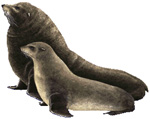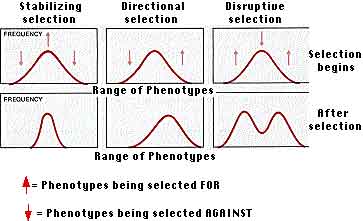 |
|
| Darwin theorized that it was the process of natural
selection that drove the process of evolution. (Darwin had
no knowledge of genetic material at the time) An organism that had characteristics that gave it reproductive success in its environment would pass its traits (genes) on over time. Beneficial changes in characteristics as a result of genetic mutation accumulate to create new species. Other reasons may affect evolutionary change >>
Founder Effect - when a small number of
individuals break away from a population and establish a new closed
population the allele frequency of the new pop. may not be the same as the
old pop. | |
 Types
of Selection Pressures Types
of Selection PressuresImagine the coevolution that occurs between hummingbirds and flowers they each benefit from nectar feeding behaviors. Imagine now that how the flower structure itself will act to stabilize, direct or disrupt the allelic frequency of beak length. | |
Stabilizing > Directional > Disruptive > |
|
Sexual selection Sexual selection favors traits that enhance the mating success of an individual. One such general trait is sexual dimorphism. This is readily apparent in the fiddler crab who's giant pincer claw is a sexual enhancement to mating. In many species of birds it is the quality of a males song that song that tells the  female something of his sexual vigour and health (all
meaning good genes!!).
female something of his sexual vigour and health (all
meaning good genes!!).Often male birds posses elaborate feather structures that are an obvious impediment to survival.  Many marine
pinnipeds (seals) display sexually selected traits such as size and
aggressive behavior in males. The male that can commandeer the limited
breeding ground areas on remote islands will have the greatest fitness. Many marine
pinnipeds (seals) display sexually selected traits such as size and
aggressive behavior in males. The male that can commandeer the limited
breeding ground areas on remote islands will have the greatest fitness. | |
